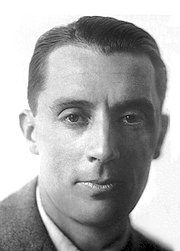Frédéric Joliot-Curie
French scientist (1900-1958) From Wikipedia, the free encyclopedia
Jean Frédéric Joliot-Curie (French: [fʁedeʁik ʒɔljo kyʁi]; né Joliot; 19 March 1900 – 14 August 1958) was a French physicist.
Frédéric Joliot-Curie | |
|---|---|
 | |
| Born | Jean Frédéric Joliot 19 March 1900 Paris, France |
| Died | 14 August 1958 (aged 58) Paris, France |
| Nationality | France |
| Alma mater | University of Paris |
| Known for | Atomic nuclei |
| Spouse | Irène Joliot-Curie |
| Children | Hélène Langevin-Joliot (b. 1927) Pierre Joliot (b. 1932) |
| Awards |
|
| Scientific career | |
| Fields | Physics, chemistry |
| Institutions | Orsay Faculty of Sciences |
He was the husband of Irène Joliot-Curie. Both were given the Nobel Prize in Chemistry in 1935 for their discovery of artificial radioactivity.[1][2]
He founded with his wife Irène Joliot-Curie the Orsay Faculty of Sciences, part of the Paris-Saclay University.[3]
References
Wikiwand - on
Seamless Wikipedia browsing. On steroids.
